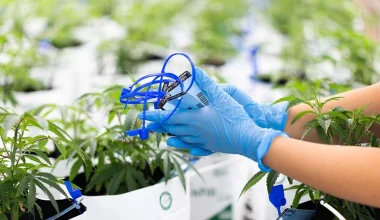Sometime in 2025, the IRS could stop taxing state-regulated marijuana companies like cocaine kingpins.
As a bonus, licensed marijuana operators might no longer compete with mainstream retailers selling intoxicating THC products that meet the federal definition of hemp.
Tax reform and some resolution to the civil war between marijuana and hemp are modest asks.
But a future where these longstanding problems are finally resolved would represent a dream scenario for many operators in the $32 billion state-regulated marijuana industry.
That’s a reflection of the steady advances that cannabis reform made in 2024.
The year behind
Cannabis industry progress was slow in 2024.
Congress failed to pass marijuana reform bills, and the Drug Enforcement Administration delayed reclassifying marijuana as a legitimate medicine until this year.
Voters largely rejected adult-use legalization – including in Florida, where marijuana multistate operators spent nearly $150 million in a losing effort – giving credence to the idea that easy and available reform efforts have maxed out.
Yet very big changes loom on the horizon.
Relief from the tax burden of Section 280E is closer than ever, and President-elect Donald Trump will soon become the first POTUS to have endorsed an adult-use marijuana legalization measure.
Here are our cannabis industry predictions for 2025:
1. Schedule 3 is coming
The process to reclassify marijuana as a Schedule 3 drug must end sometime in 2025.
This will be the year a DEA administrative law judge rules on the May 2024 proposal to change marijuana’s status under federal law, after hearing – at length – arguments from skeptics about why he shouldn’t.
Regardless of the decision, it’s likely to face court challenges.
Plus, Trump’s new DEA administrator is empowered to ignore the judge’s ruling – whatever that might be.
2. Marijuana-friendly president
This month, Republicans will assume control of all three branches of government for the first time since 2017, the previous time Donald Trump took the oath of office.
Many marijuana industry operators and investors openly believe Trump will be the most marijuana-friendly president in history – hopes pinned on a September 2024 social media post in which the then-candidate endorsed Florida adult-use legalization Amendment 3, a podcast appearance and … not much else.
Trump’s appointments so far don’t suggest marijuana reform is at the top of his agenda.
His attorney general, pending confirmation by the U.S. Senate, will be Pam Bondi, a former Florida attorney general who once signed off on a report suggesting marijuana leads to fentanyl use.
And instead of Mitch McConnell, whom Democrats twice blamed for blocking SAFER Banking’s inclusion in a lame-duck session budget bill, the Senate will be led by Sen. Jon Thune, another longtime opponent of marijuana reform.
Constitutional scholars say there isn’t much more beyond administrative rescheduling that a president can do.
But that’s based on existing norms and understandings of the power of the office.
If the president were t suddenly demand that House Speaker Mike Johnson schedule hearings for marijuana banking reform, Johnson would likely do it.
But given the list of other pressing issues facing the Trump administration, such as fentanyl and the border crisis, some observers believe major action isn’t going to happen until after the 2026 midterm elections.
“With a Republican-controlled White House, Senate and House, we’re likely to see a focus on more conservative priorities, especially in the first part of the year,” said Michael Teller, Atlanta-based chief operating officer of The Panther Group, an advisory firm.
“This will leave things like SAFE Banking on the back burner.”
3. Showdown with the IRS
The IRS made it clear in a memo issued last June that cannabis companies still must pay their full tax liabilities and can’t take most typical business deductions on their federal returns because of Internal Revenue Code Section 280E.
Then, nearly every major marijuana MSO went ahead and filed for those deductions anyway.
While that’s a strategy some cannabis-centric tax accountancies are encouraging, there are just as many seasoned tax attorneys who insist it’s a road to ruin.
This all adds up to a monumental tax fight that will set precedent for the rest of the industry.
4. California tax crisis
The California cannabis industry’s biggest creditor isn’t retail shareholders or bondholders – it’s likely the state franchise tax board.
Licensed marijuana stores in California owe the state Department of Tax and Fee Administration a staggering $1.3 billion.
And the state’s 15% excise tax is set to increase to 19% on July 1 unless the state Legislature intervenes.
With state spending outstripping revenue by an estimated $20 billion starting in 2026, lawmakers will be loath to cut off a source of badly needed revenue or forgive past-due bills.
Operators have complained for many years that high taxes, which squeeze legal operators’ margins and persuade customers to access cheaper cannabis on the illicit market, have a knock-on effect that’s hampering legalization.
So far, there hasn’t been any reckoning.
But with bigger tax bills coming due at a time California is in desperate need of cash, a showdown might be unavoidable.
5. Hemp-derived THC crackdown
While Congress did not do much related to marijuana in 2024 – such as introducing a new Farm Bill to address the hemp loophole that federal lawmakers accidentally created with the 2018 Farm Bill – state officials have taken decisive action.
California Gov. Gavin Newsom signed a blanket ban on intoxicating hemp products, officials in Texas, Tennessee and other states where such products have become popular believe the status quo simply cannot continue.
“The decision to push the Farm Bill out gives us hope that policymakers will use this extra time to craft sound and safe regulations for hemp-derived intoxicants,” said Matthew Melander, president of Denver-based cannabis operator Sun Theory.
Eventually, observers believe regulations for THC are the only solution, regardless of its source.
But that might extend beyond 2025.
“2025 could be a tough year for the entire cannabis market (hemp and marijuana) if current trends leaning toward more restrictions and prohibition continue,” said Ryan Oquin, vice president of sales at Texas-based hemp company Hometown Hero.
6. Supreme Court-bound
In late December, while most of the cannabis industry descended on Las Vegas for MJBizCon, prominent attorneys for Chicago-based MSO Verano Holdings Corp. and three Massachusetts-based plaintiffs were arguing before a U.S. Circuit Court of Appeals judge that federal marijuana prohibition is legally unsound.
At the heart of their argument that federal marijuana prohibition is unconstitutional is a 2005 Supreme Court decision that they insist must be revisited – and overturned.
That theory has yet to convince lower-court judges, who say any reversal of a Supreme Court decision can be done only by that body – and that’s exactly where the plaintiffs vow to take their case.
The plaintiffs still have to be rejected by the U.S. Circuit Court of Appeals before they can appeal to the Supreme Court, however.
That rejection likely will come in 2025, meaning a Supreme Court petition – and, potentially, yet another landmark federal decision – could soon follow.
2024 MJBiz Factbook – now available!
Exclusive industry data and analysis to help you make informed business decisions and avoid costly missteps. All the facts, none of the hype.
Featured inside:
- Financial forecasts + capital investment trends
- 200+ pages and 49 charts highlighting key data figures and sales trends
- State-by-state guide to regulations, taxes & market opportunities
- Monthly and quarterly updates, with new data & insights
- And more!
7. State marijuana reforms on pause
Lawmakers in Pennsylvania vowed to vote on adult-use marijuana legalization sometime in the spring.
But that promise has been made before – and to no avail.
After major defeats in Florida, North Dakota and South Dakota, the only hope for adult-use legalization will be state legislatures such as the one in Harrisburg, Pennsylvania.
And with a few major exceptions, such as Delaware and Minnesota, lawmakers have been reluctant to move legalization along.
Even if they do, the going is slow: Neither the Delaware market nor Minnesota’s is open for business yet.
Chris Roberts can be reached at chris.roberts@mjbizdaily.com.
Medical Disclaimer:
The information provided in these blog posts is intended for general informational and educational purposes only. It is not a substitute for professional medical advice, diagnosis, or treatment. Always seek the advice of your physician or other qualified healthcare provider with any questions you may have regarding a medical condition. The use of any information provided in these blog posts is solely at your own risk. The authors and the website do not recommend or endorse any specific products, treatments, or procedures mentioned. Reliance on any information in these blog posts is solely at your own discretion.





